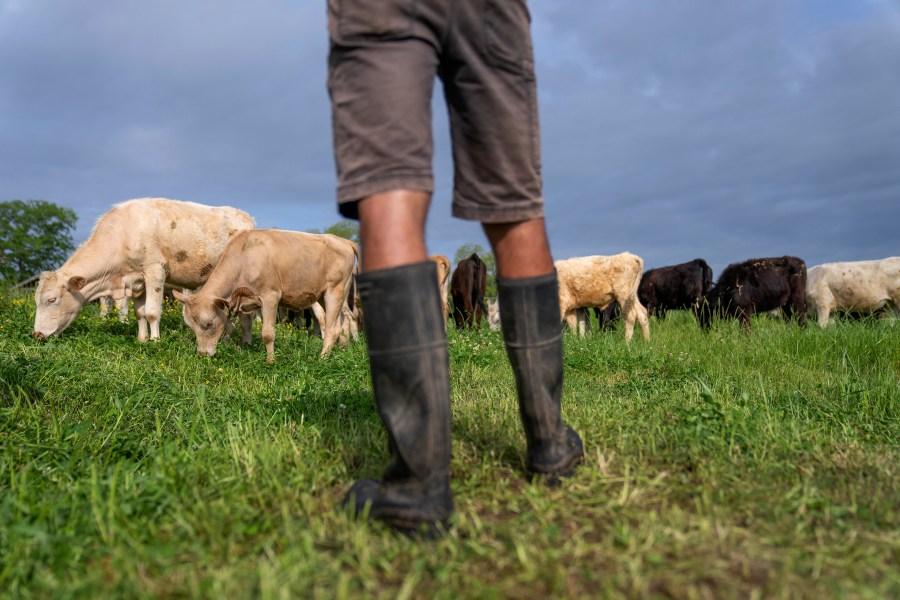[ad_1]

DENVER (KDVR) — Colorado’s legislators are sharing firmer stances on U.S. beef after Colorado cattle producers spoke out against statements made by President Donald Trump, suggesting the U.S. should buy more beef from Argentina to help lower costs.
“We would buy some beef from Argentina,” Trump told reporters onboard Air Force One on Sunday. “If we do that, that will bring our beef prices down.”
Colorado ranchers were quick to respond, voicing strong opposition and advocating for support of U.S. ranchers and farmers. On Friday, Colorado Gov. Jared Polis and U.S. House members also spoke out.
“If the President floods the market with Argentinian beef, he will crush hardworking Colorado farmers and ranchers, turning his back on the industry that helps drive our western economy and puts food on our tables,” said Polis in a release. “On the heels of a $20 billion bailout for Argentina during a government shutdown, when American families are facing hunger and skyrocketing health care costs, it’s even worse to intentionally harm American farmers.
“This thoughtless move would take business from American farmers and ranchers to prop up the president’s friend, and I like Javier Milei as much as the next guy and he has great hair, but helping him doesn’t justify hurting ranchers. If the President moves forward, it will be a slap in the face to hardworking producers across the entire nation,” said Polis.
Why does beef cost so much?
According to the U.S. Department of Agriculture, the reason beef prices are high is because there is less beef in the U.S.: The national herd has reached a 75-year low as consumer demand has grown 9% over the past decade.
However, the agency noted that it takes time to increase the size of a herd, and shared a plan aimed at supporting that goal.
“At USDA we are protecting our beef industry and incentivizing new ranchers to take up the noble vocation of ranching,” said USDA Sec. Brooke Rollins in a Wednesday release. “Today, USDA will immediately expedite deregulatory reforms, boost processing capacity, including getting more locally raised beef into schools, and working across the government to fix longstanding common-sense barriers for ranchers like outdated grazing restrictions.”
USDA also noted that since 2017, over 17% of U.S. family farms have been lost. The Colorado Cattlemen’s Association told FOX31 on Tuesday that cattle production is the state’s number one agricultural commodity. Ranchers raise over 2.7 million head of cattle in the state and in 2024, the state exported $1.3 billion in beef.
Colorado Commissioner of Agriculture Kate Greenberg also weighed in, saying that importing “cheap Argentinian beef” would undercut Colorado producers, among other impacts.
“Colorado producers are leading in stewardship and sustainability, and our high standards for animal husbandry and quality are what consumers truly want. Federal interference and the timing of announcements regarding imports only exacerbate the struggles of our domestic producers, impacting their ability to rebuild herds and receive fair prices for their cattle,” Greenberg said in Polis’s release. “The federal government should focus more on expanding market opportunities for American beef, which is our focus here in Colorado.”
Bipartisan statement calls for Trump to reconsider
Reports were shared on Friday that a White House staffer said Trump plans to quadruple the tariff-rate quota for imported beef from Argentina, an effort to lower food prices in the U.S., resulting in reactions from Congress members across the country.
Colorado’s bipartisan House delegation, which includes Reps. Joe Neguse, Jeff Hurd, Lauren Boebert, Jeff Crank, Jason Crow, Diana Degette, Gabe Evans and Brittany Pettersen all signed onto a statement issued in support of Colorado’s local ranchers and rural economies.
“Colorado’s beef industry — and the farmers, ranchers, and producers who have sustained it across generations — is essential to the vitality of our state’s economy and our nation’s food security,” the delegation said.
“While we understand the importance of fair, strong trade relationships and diverse markets, we urge the administration to reconsider the increase in imports of Argentine beef that could pose risk to the domestic cattle market and the countless individuals across our state whose livelihoods depend on it,” the delegation continued. “Together, we must advocate for Colorado’s cattle producers and consumers alike, prioritizing American beef and working to strengthen our agriculture industry for the future.”
The delegation pointed to a report from the Colorado Office of State Planning and Budgeting that showed that a reduction in beef exports could result in over 260 jobs lost and nearly $80 million in reduced economic output.
Polis also noted that Colorado is fifth in the nation for beef exports and that beef is a top driver in the state’s agricultural economy.
The U.S. exported a total of $10.45 billion in beef and beef products in 2024, Polis shared, with top export countries being Mexico, Canada, South Korea, Japan and China. Polis said that these countries are all facing “on-again off off-again tariffs” from Trump.
[ad_2]

Anthony Sutton is a business strategist and writer with a passion for management, leadership, and entrepreneurship. With years of experience in the corporate world, he shares insights on business growth, strategy, and innovation through management-opleiding.org.




